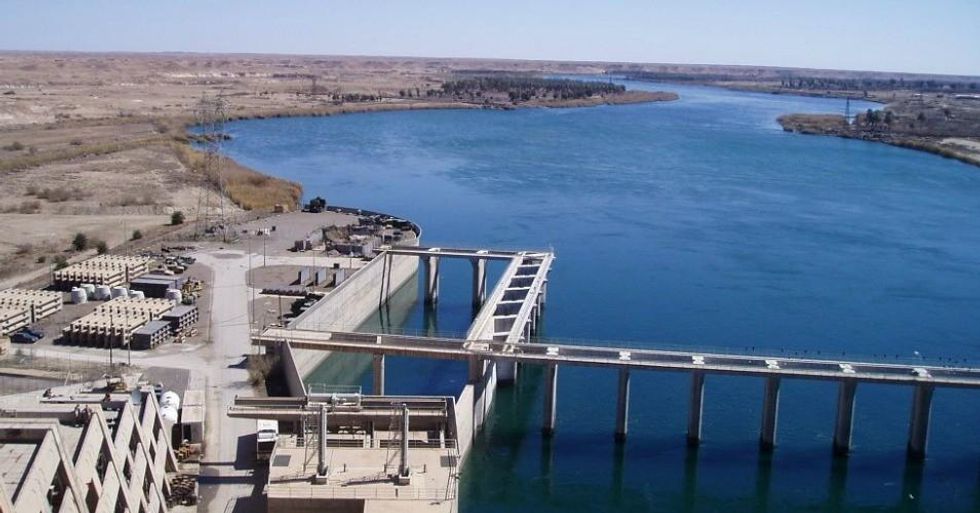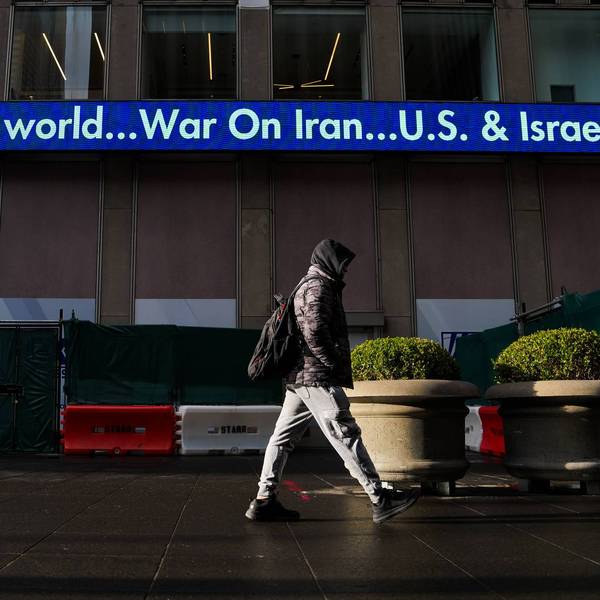As Violence Grips Iraq, Fears of Pre-Emptive Flooding Arise
Dam operators warn that army's plan to open floodgates to thwart ISIS would create massive destruction to villages

Citing statements by Iraqi security officials made Wednesday, the New York Times reported that ISIS forces "were advancing on the Haditha Dam," located roughly 120 miles from Baghdad.
The dam is the country's second largest and generates hydroelectric power.
The Times does not cite a specific threat made by ISIS forces that they would open the floodgates, but notes that ISIS fighters in April seized the Falluja Dam and unleashed flooding.
The Times reporting adds that Iraqi government forces were responding to the possibility by being prepared to open the dam's floodgates themselves. From the Times:
"This will lead to the flooding of the town and villages and will harm you also," the [dam] employee said he told the [army] officers.
Regardless of which side might open the floodgates, it is the civilian population who would suffer in such an event, Peter Bosshard, Policy Director of International Rivers, an organization that works to protect rivers and the rights of communities that depend on them, explained to Common Dreams.
"Dams have been used as weapons of mass destruction through the ages," Bosshard continued. "In the first recorded water war, the army of Umma, a Sumerian city state, drained irrigation canals against their enemies of Lagash in present-day Iraq, not far from Haditha Dam, 4,500 years ago. In the most infamous case, the nationalist army of Chian Kai Shek destroyed the dikes of the Yellow River in 1937 to slow the advancing Japanese army, thereby flooding hundreds of thousands of square kilometers of land and killing at least 800,000 of its own people," he added.
Khalid Salman, head of the Haditha local council, told the Washington Post that ISIS would want take over the dam not to unleash flooding but to control the power plant powered by it, thus being able to provide a service to the local population.
"Of course they want to control the dam, which is very important, not only for Anbar, but for all of Iraq," the Post quotes Salman as saying.
Meanwhile, violence continues to erupt in the country. Reuters reports that on Thursday battles were "raging" in the city of Tikrit, where Iraqi forces are launching a counter-attack on Sunni militant forces.
And on Wednesday, Shiite cleric Moqtada al-Sadr rebuked gains made by ISIS, and said his supporters "will shake the ground under the feet of ignorance and extremism," Agence France-Presse reports.
Iraq's Prime Minister Nour al-Maliki has told the BBC that he welcomed strikes against ISIS carried out by Syria, which hit within the Syrian side of the Iraq/Syira border. He said they were carried out without coordination, but added, "We actually welcome any Syrian strike against ISIS."
Amidst the official comments by leaders and new gains in territory by ISIS, a humanitarian crisis continues to unfold, as over one million Iraqis--including half a million children--have been forced to flee their homes.
"Yet again, another humanitarian crisis hits war-torn Iraq, disproportionately and negatively impacting the hungry poor," reads a statement issued Wednesday by United Nations World Food Programme Executive Director Ertharin Cousin.
"The UN and the entire humanitarian community are surging staff, releasing funds and drawing on all available stocks to assist people affected by the fighting and meet the urgent growing needs," Cousin added.
______________________________
An Urgent Message From Our Co-Founder
Dear Common Dreams reader, The U.S. is on a fast track to authoritarianism like nothing I've ever seen. Meanwhile, corporate news outlets are utterly capitulating to Trump, twisting their coverage to avoid drawing his ire while lining up to stuff cash in his pockets. That's why I believe that Common Dreams is doing the best and most consequential reporting that we've ever done. Our small but mighty team is a progressive reporting powerhouse, covering the news every day that the corporate media never will. Our mission has always been simple: To inform. To inspire. And to ignite change for the common good. Now here's the key piece that I want all our readers to understand: None of this would be possible without your financial support. That's not just some fundraising cliche. It's the absolute and literal truth. We don't accept corporate advertising and never will. We don't have a paywall because we don't think people should be blocked from critical news based on their ability to pay. Everything we do is funded by the donations of readers like you. Will you donate now to help power the nonprofit, independent reporting of Common Dreams? Thank you for being a vital member of our community. Together, we can keep independent journalism alive when it’s needed most. - Craig Brown, Co-founder |

Citing statements by Iraqi security officials made Wednesday, the New York Times reported that ISIS forces "were advancing on the Haditha Dam," located roughly 120 miles from Baghdad.
The dam is the country's second largest and generates hydroelectric power.
The Times does not cite a specific threat made by ISIS forces that they would open the floodgates, but notes that ISIS fighters in April seized the Falluja Dam and unleashed flooding.
The Times reporting adds that Iraqi government forces were responding to the possibility by being prepared to open the dam's floodgates themselves. From the Times:
"This will lead to the flooding of the town and villages and will harm you also," the [dam] employee said he told the [army] officers.
Regardless of which side might open the floodgates, it is the civilian population who would suffer in such an event, Peter Bosshard, Policy Director of International Rivers, an organization that works to protect rivers and the rights of communities that depend on them, explained to Common Dreams.
"Dams have been used as weapons of mass destruction through the ages," Bosshard continued. "In the first recorded water war, the army of Umma, a Sumerian city state, drained irrigation canals against their enemies of Lagash in present-day Iraq, not far from Haditha Dam, 4,500 years ago. In the most infamous case, the nationalist army of Chian Kai Shek destroyed the dikes of the Yellow River in 1937 to slow the advancing Japanese army, thereby flooding hundreds of thousands of square kilometers of land and killing at least 800,000 of its own people," he added.
Khalid Salman, head of the Haditha local council, told the Washington Post that ISIS would want take over the dam not to unleash flooding but to control the power plant powered by it, thus being able to provide a service to the local population.
"Of course they want to control the dam, which is very important, not only for Anbar, but for all of Iraq," the Post quotes Salman as saying.
Meanwhile, violence continues to erupt in the country. Reuters reports that on Thursday battles were "raging" in the city of Tikrit, where Iraqi forces are launching a counter-attack on Sunni militant forces.
And on Wednesday, Shiite cleric Moqtada al-Sadr rebuked gains made by ISIS, and said his supporters "will shake the ground under the feet of ignorance and extremism," Agence France-Presse reports.
Iraq's Prime Minister Nour al-Maliki has told the BBC that he welcomed strikes against ISIS carried out by Syria, which hit within the Syrian side of the Iraq/Syira border. He said they were carried out without coordination, but added, "We actually welcome any Syrian strike against ISIS."
Amidst the official comments by leaders and new gains in territory by ISIS, a humanitarian crisis continues to unfold, as over one million Iraqis--including half a million children--have been forced to flee their homes.
"Yet again, another humanitarian crisis hits war-torn Iraq, disproportionately and negatively impacting the hungry poor," reads a statement issued Wednesday by United Nations World Food Programme Executive Director Ertharin Cousin.
"The UN and the entire humanitarian community are surging staff, releasing funds and drawing on all available stocks to assist people affected by the fighting and meet the urgent growing needs," Cousin added.
______________________________

Citing statements by Iraqi security officials made Wednesday, the New York Times reported that ISIS forces "were advancing on the Haditha Dam," located roughly 120 miles from Baghdad.
The dam is the country's second largest and generates hydroelectric power.
The Times does not cite a specific threat made by ISIS forces that they would open the floodgates, but notes that ISIS fighters in April seized the Falluja Dam and unleashed flooding.
The Times reporting adds that Iraqi government forces were responding to the possibility by being prepared to open the dam's floodgates themselves. From the Times:
"This will lead to the flooding of the town and villages and will harm you also," the [dam] employee said he told the [army] officers.
Regardless of which side might open the floodgates, it is the civilian population who would suffer in such an event, Peter Bosshard, Policy Director of International Rivers, an organization that works to protect rivers and the rights of communities that depend on them, explained to Common Dreams.
"Dams have been used as weapons of mass destruction through the ages," Bosshard continued. "In the first recorded water war, the army of Umma, a Sumerian city state, drained irrigation canals against their enemies of Lagash in present-day Iraq, not far from Haditha Dam, 4,500 years ago. In the most infamous case, the nationalist army of Chian Kai Shek destroyed the dikes of the Yellow River in 1937 to slow the advancing Japanese army, thereby flooding hundreds of thousands of square kilometers of land and killing at least 800,000 of its own people," he added.
Khalid Salman, head of the Haditha local council, told the Washington Post that ISIS would want take over the dam not to unleash flooding but to control the power plant powered by it, thus being able to provide a service to the local population.
"Of course they want to control the dam, which is very important, not only for Anbar, but for all of Iraq," the Post quotes Salman as saying.
Meanwhile, violence continues to erupt in the country. Reuters reports that on Thursday battles were "raging" in the city of Tikrit, where Iraqi forces are launching a counter-attack on Sunni militant forces.
And on Wednesday, Shiite cleric Moqtada al-Sadr rebuked gains made by ISIS, and said his supporters "will shake the ground under the feet of ignorance and extremism," Agence France-Presse reports.
Iraq's Prime Minister Nour al-Maliki has told the BBC that he welcomed strikes against ISIS carried out by Syria, which hit within the Syrian side of the Iraq/Syira border. He said they were carried out without coordination, but added, "We actually welcome any Syrian strike against ISIS."
Amidst the official comments by leaders and new gains in territory by ISIS, a humanitarian crisis continues to unfold, as over one million Iraqis--including half a million children--have been forced to flee their homes.
"Yet again, another humanitarian crisis hits war-torn Iraq, disproportionately and negatively impacting the hungry poor," reads a statement issued Wednesday by United Nations World Food Programme Executive Director Ertharin Cousin.
"The UN and the entire humanitarian community are surging staff, releasing funds and drawing on all available stocks to assist people affected by the fighting and meet the urgent growing needs," Cousin added.
______________________________

